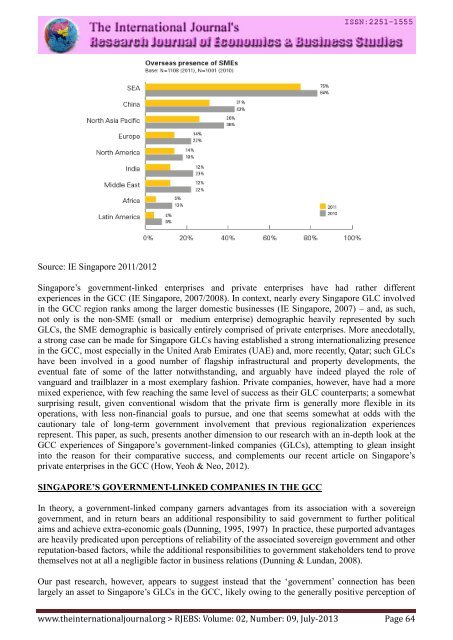Research Journal of Economics & Business Studies - RJEBS - The ...
Research Journal of Economics & Business Studies - RJEBS - The ...
Research Journal of Economics & Business Studies - RJEBS - The ...
You also want an ePaper? Increase the reach of your titles
YUMPU automatically turns print PDFs into web optimized ePapers that Google loves.
Source: IE Singapore 2011/2012<br />
Singapore’s government-linked enterprises and private enterprises have had rather different<br />
experiences in the GCC (IE Singapore, 2007/2008). In context, nearly every Singapore GLC involved<br />
in the GCC region ranks among the larger domestic businesses (IE Singapore, 2007) – and, as such,<br />
not only is the non-SME (small or medium enterprise) demographic heavily represented by such<br />
GLCs, the SME demographic is basically entirely comprised <strong>of</strong> private enterprises. More anecdotally,<br />
a strong case can be made for Singapore GLCs having established a strong internationalizing presence<br />
in the GCC, most especially in the United Arab Emirates (UAE) and, more recently, Qatar; such GLCs<br />
have been involved in a good number <strong>of</strong> flagship infrastructural and property developments, the<br />
eventual fate <strong>of</strong> some <strong>of</strong> the latter notwithstanding, and arguably have indeed played the role <strong>of</strong><br />
vanguard and trailblazer in a most exemplary fashion. Private companies, however, have had a more<br />
mixed experience, with few reaching the same level <strong>of</strong> success as their GLC counterparts; a somewhat<br />
surprising result, given conventional wisdom that the private firm is generally more flexible in its<br />
operations, with less non-financial goals to pursue, and one that seems somewhat at odds with the<br />
cautionary tale <strong>of</strong> long-term government involvement that previous regionalization experiences<br />
represent. This paper, as such, presents another dimension to our research with an in-depth look at the<br />
GCC experiences <strong>of</strong> Singapore’s government-linked companies (GLCs), attempting to glean insight<br />
into the reason for their comparative success, and complements our recent article on Singapore’s<br />
private enterprises in the GCC (How, Yeoh & Neo, 2012).<br />
SINGAPORE’S GOVERNMENT-LINKED COMPANIES IN THE GCC<br />
In theory, a government-linked company garners advantages from its association with a sovereign<br />
government, and in return bears an additional responsibility to said government to further political<br />
aims and achieve extra-economic goals (Dunning, 1995, 1997) In practice, these purported advantages<br />
are heavily predicated upon perceptions <strong>of</strong> reliability <strong>of</strong> the associated sovereign government and other<br />
reputation-based factors, while the additional responsibilities to government stakeholders tend to prove<br />
themselves not at all a negligible factor in business relations (Dunning & Lundan, 2008).<br />
Our past research, however, appears to suggest instead that the ‘government’ connection has been<br />
largely an asset to Singapore’s GLCs in the GCC, likely owing to the generally positive perception <strong>of</strong><br />
www.theinternationaljournal.org > <strong>RJEBS</strong>: Volume: 02, Number: 09, July-2013 Page 64
















